Unit 7 Will people have robots Section A课件 人教版英语八年级上册
文档属性
| 名称 | Unit 7 Will people have robots Section A课件 人教版英语八年级上册 | 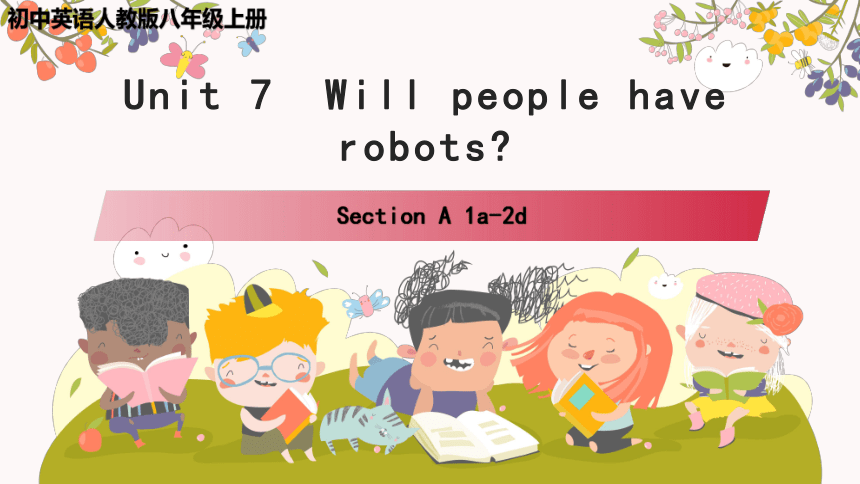 | |
| 格式 | pptx | ||
| 文件大小 | 9.8MB | ||
| 资源类型 | 试卷 | ||
| 版本资源 | 人教新目标(Go for it)版 | ||
| 科目 | 英语 | ||
| 更新时间 | 2024-09-26 17:56:43 | ||
图片预览

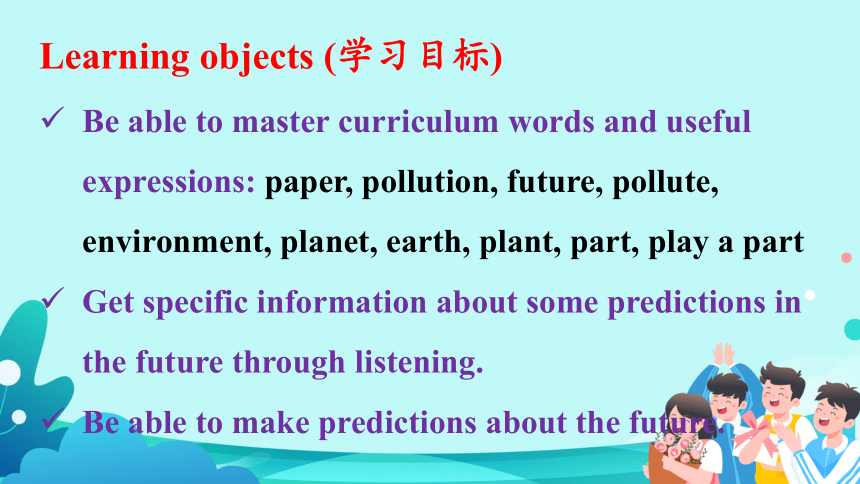
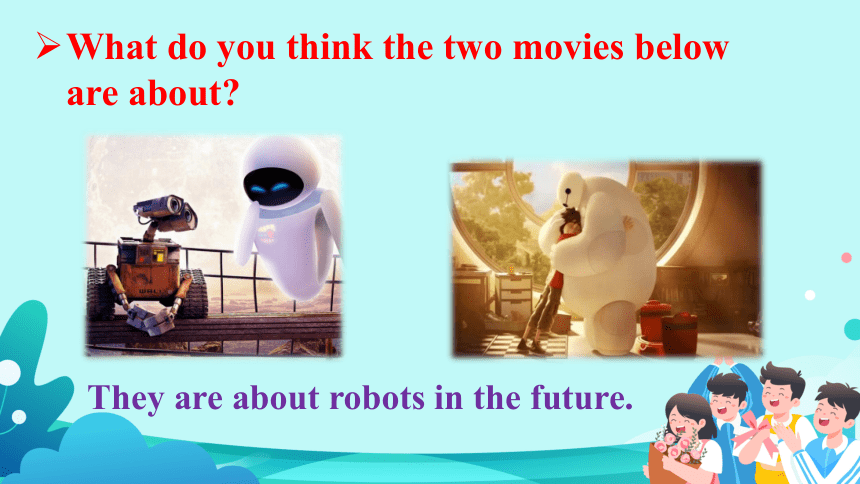
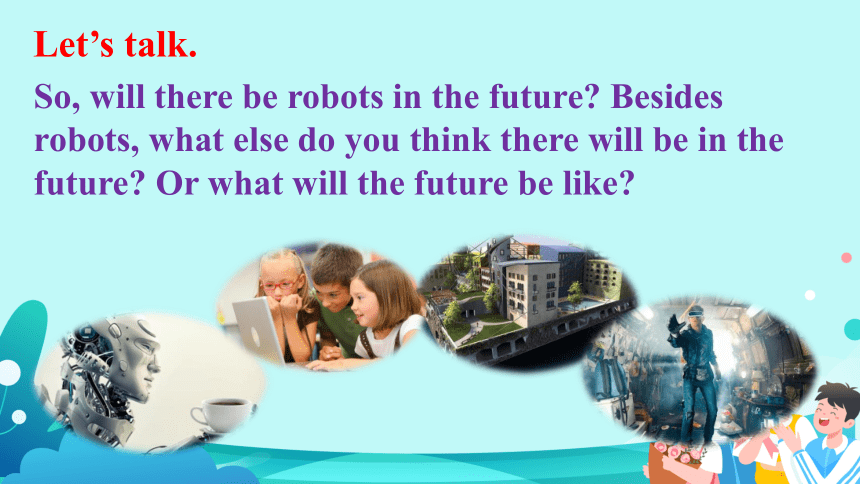
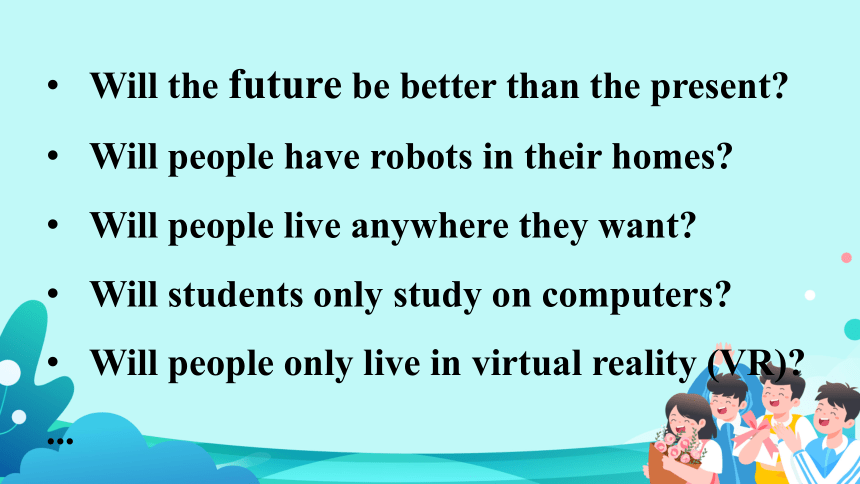
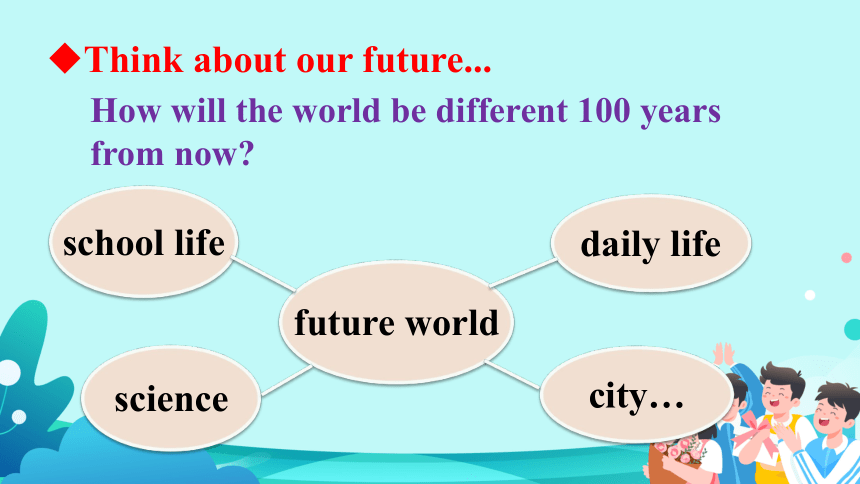
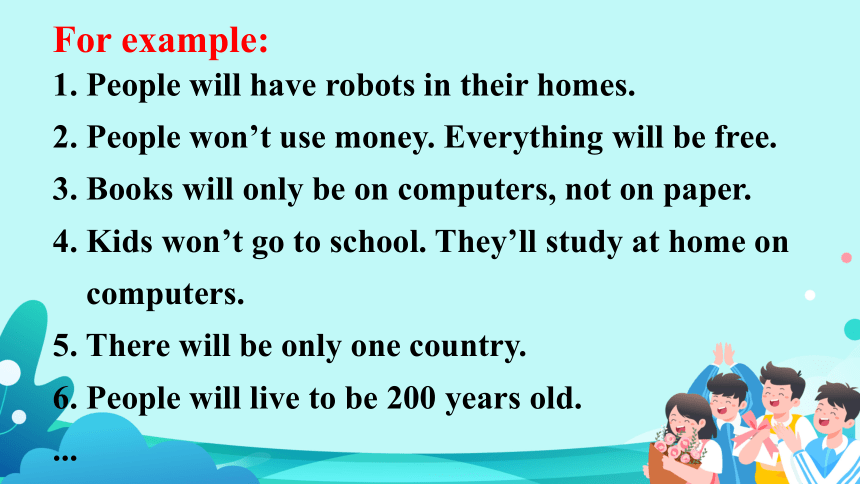
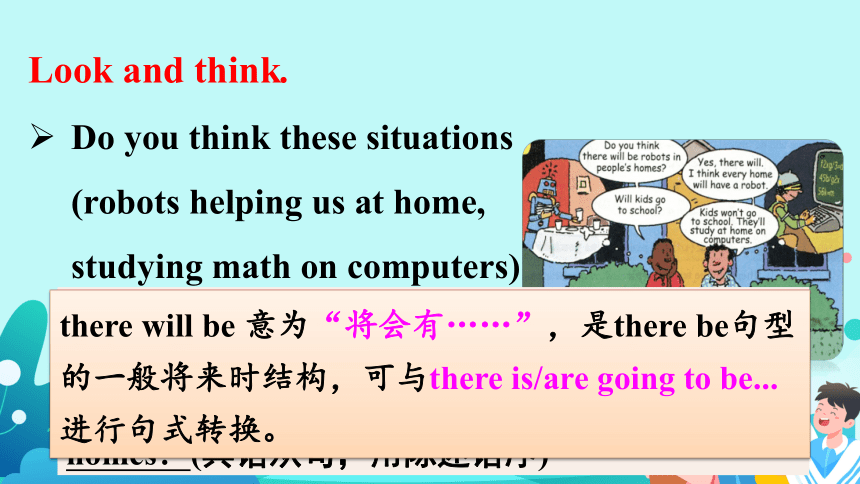
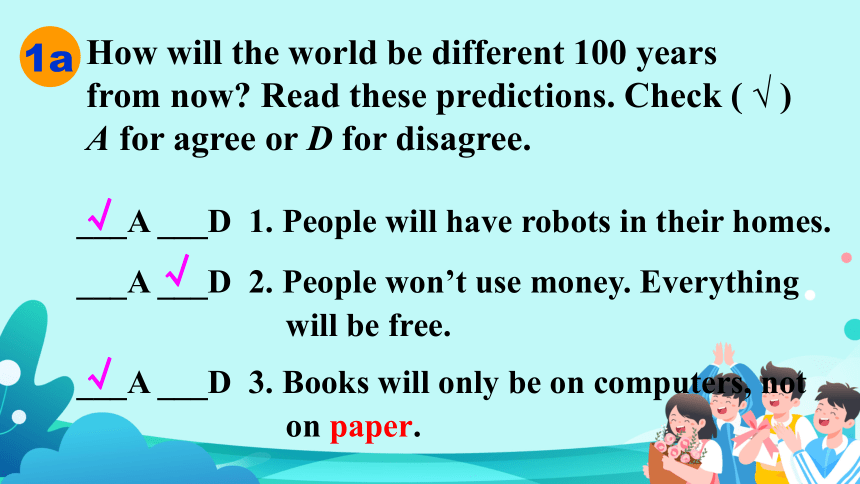
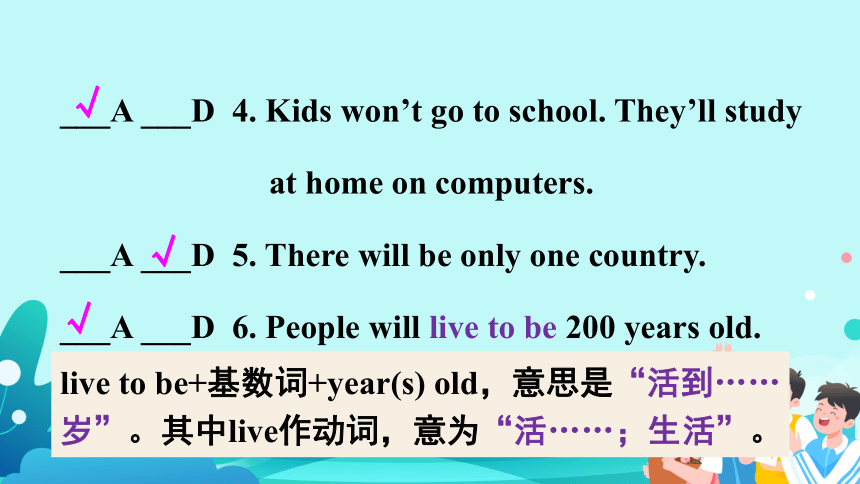
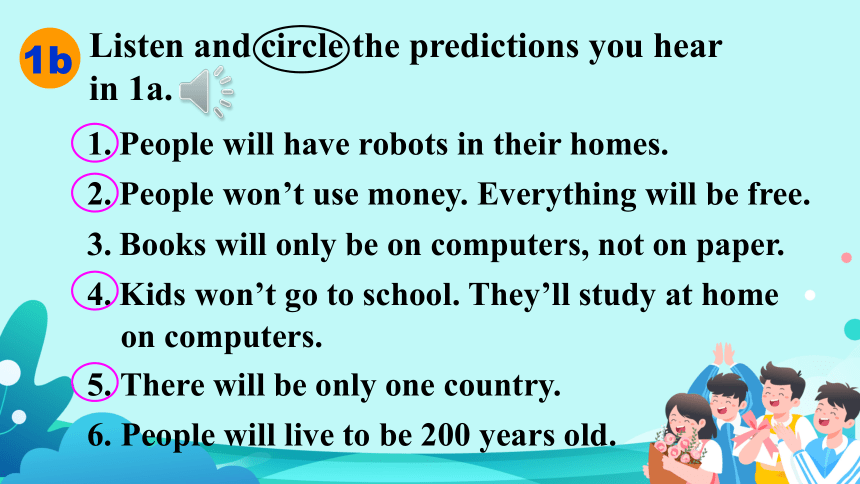
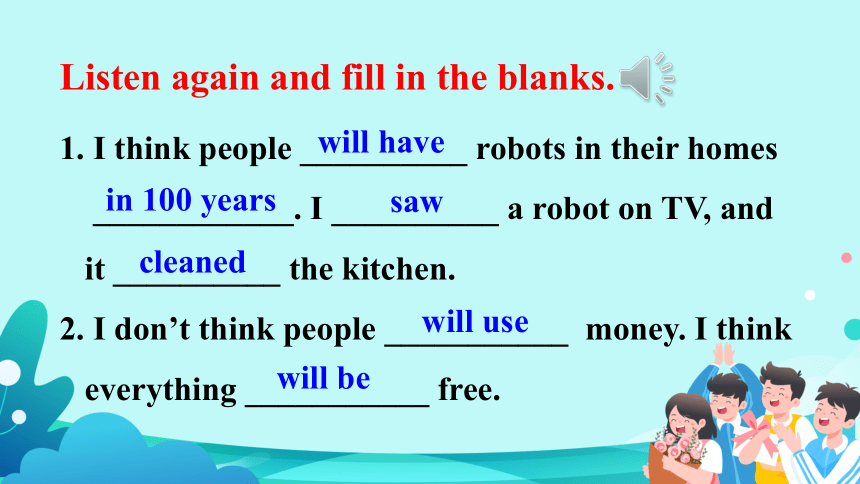
文档简介
(共67张PPT)
初中英语人教版八年级上册
Section A 1a-2d
Unit 7 Will people have robots
Learning objects (学习目标)
Be able to master curriculum words and useful expressions: paper, pollution, future, pollute, environment, planet, earth, plant, part, play a part
Get specific information about some predictions in the future through listening.
Be able to make predictions about the future.
They are about robots in the future.
What do you think the two movies below are about
Let’s talk.
So, will there be robots in the future Besides robots, what else do you think there will be in the future Or what will the future be like
Will the future be better than the present
Will people have robots in their homes
Will people live anywhere they want
Will students only study on computers
Will people only live in virtual reality (VR)
...
Think about our future...
future world
school life
daily life
science
city…
How will the world be different 100 years
from now
1. People will have robots in their homes.
2. People won’t use money. Everything will be free.
3. Books will only be on computers, not on paper.
4. Kids won’t go to school. They’ll study at home on
computers.
5. There will be only one country.
6. People will live to be 200 years old.
...
For example:
Look and think.
Do you think these situations (robots helping us at home, studying math on computers) are happening now or will happen in the future
(there be句型的一般将来时结构)
Do you think (主句) there will be robots in people’s homes (宾语从句,用陈述语序)
there will be 意为“将会有……”,是there be句型的一般将来时结构,可与there is/are going to be...进行句式转换。
How will the world be different 100 years
from now Read these predictions. Check ( √ ) A for agree or D for disagree.
___A ___D 1. People will have robots in their homes.
___A ___D 2. People won’t use money. Everything
will be free.
___A ___D 3. Books will only be on computers, not
on paper.
1a
√
√
√
___A ___D 4. Kids won’t go to school. They’ll study
at home on computers.
___A ___D 5. There will be only one country.
___A ___D 6. People will live to be 200 years old.
√
live to be+基数词+year(s) old,意思是“活到……岁”。其中live作动词,意为“活……;生活”。
√
√
1b
Listen and circle the predictions you hear
in 1a.
People will have robots in their homes.
People won’t use money. Everything will be free.
Books will only be on computers, not on paper.
Kids won’t go to school. They’ll study at home
on computers.
5. There will be only one country.
6. People will live to be 200 years old.
Listen again and fill in the blanks.
1. I think people __________ robots in their homes
____________. I __________ a robot on TV, and
it __________ the kitchen.
2. I don’t think people ___________ money. I think
everything ___________ free.
will have
in 100 years
saw
cleaned
will use
will be
3. I think _____________ only one country. I hope
___________ world peace.
4. I think kids ___________ go to school. They
___________ at home ______________.
there will be
there will be
won’t
will study
on computers
Boy 1: Do you think people will have robots in their
homes in 100 years
Boy 2: Yes, I do. I saw a robot on TV, and it cleaned
the kitchen.
Boy 1: Well, I don’t think people will use money.
Boy 2: Do you think everything will be free
Boy 1: Yeah, probably.
Boy 2: I think there will be only one country.
Tapescripts:
Boy 1: Only one country in the world Will there be world peace
Boy 2: I hope so.
Boy 1: I think kids won’t go to school. They’ll
study at home on computers.
Boy 2: Oh, I disagree.
Boy 1: You do
Boy 2: Yeah, there will always be schools.
1c
Ask and answer questions about the predictions in 1a.
A: Will people use money in 100 years
B: No, they won’t. Everything will be free.
Will people live to be 200 years old
A: Yes, they will.
in 100 years “在100年以后”,in为介词,其后跟一段时间表示“在……之后”,通常用于一般将来时,对其提问要用how soon(多久以后)。
Will kids go to school in 100 years
No, they won’t. They’ll study at home on computers.
Will people have robots in their homes
Yes, they will.
Pair work
Do you have any other predictions about the future
There will be more people in the future.
There will be less water pollution in the future.
There will be fewer cars in the future.
2a
Listen and circle the words you hear.
There will be (more / less / fewer) people.
There will be (more / less / fewer) free time.
There will be (more / less / fewer) cars.
There will be (more / less / fewer) pollution.
There will be (more / less / fewer) trees.
more是many和much的比较级,“更多的”,既可以修饰可数名词复数,也可以修饰不可数名词。
意思 用法 比较级 最高级
few
little
many
much
不多;很少(否定)
一点(否定)
许多
许多
修饰
可数名词
修饰
不可数名词
修饰
可数名词
修饰
不可数名词
fewest
least
most
most
fewer
less
more
more
There will be fewer people. ( )
There will be less free time. ( )
There will be more cars. ( )
There will be less pollution. ( )
There will be more trees. ( )
Listen again and judge T or F.
F
T
F
T
F
more
fewer
fewer
2b
Listen again. Check(√)the predictions
you hear.
____ 1. There will be fewer people.
____ 2. There will be less free time.
____ 3. People will use the subways less.
____ 4. There will be more pollution.
____ 5. Cities will be very big and crowded.
√
√
Aspects Predictions
People There will be ____________.
Cities will be ___________
and _________, because there will be
________________.
Free time There will be ______________.
more people
really big
crowded
a lot more people
less free time
Listen and fill in the chart.
Aspects Predictions
Transportation There will be ___________.
People will use ________________.
Environment There will be _____________, and that will be ________________.
There will be ___________.
fewer cars
the subways more
less pollution
good for the earth
fewer trees
Ms. Steen: OK, now I want to hear everyone’s
predictions about the future.
Girl 1: Well, I think there will be more people.
Ms. Steen: More people OK. What else
Boy 1: I think that there will be less free time.
Ms. Steen: I hope not!
Girl 2: Well, I think there will be fewer cars.
Tapescripts:
Ms. Steen: You do
Girl 2: Yes, people will use the subways more.
Ms. Steen: That’s a great idea. Let’s hear another
prediction.
Boy 2: There will be less pollution.
Ms. Steen: That will be good for the earth!
Girl 1: I think there will be fewer trees. And
cities will be really big and crowded
because there will be a lot more people.
2c
Make conversations about the predictions
in 2a and 2b.
A: What’s your prediction about the future
B: I think there will be more pollution.
A: Really I don’t think so. But I think there
will be fewer trees.
I don’t think so. 意为“我认为不是这样。”,常用于口语中,表示不赞同对方的意见或观点,其肯定形式为“I think so.”。
Role-play
What’s your prediction about the future
I think there will be more people.
Really I don’t think so. But I think there will be less free time.
Listen and choose.
1. What is Jill doing
A. She is reading a book about the cities.
B. She is reading a book about the future.
C. She is reading a book about the environment.
2. What can people do to save the earth
A. We can use less water and plant more trees.
B. Everyone should play a part in saving the earth.
C. Both A and B.
Role-play the conversation.
Nick: What are you reading, Jill
Jill: It’s a book about the future.
Nick: Sounds cool. So what will the future be like
Jill: Well, cities will be more crowded and polluted.
There will be fewer trees and the environment
will be in great danger.
What will... be like 意为“……将会是什么样子 ”,是“What is/are ... like ”的一般将来时。其中 like是介词,意为“像”。
in danger 处于危险中
2d
Nick: That sounds bad! Will we have to move to
other planets
Jill: Maybe. But I want to live on the earth.
Nick: Me, too. Then what can we do
Jill: We can use less water and plant more trees.
Everyone should play a part in saving the earth.
play a part意为“参与;发挥作用”。play a part in接名词、代词或动词-ing形式。play a part in的同义短语是take part in。
Read and fill in the blanks:
1. Jill is reading a book about the _______.
2. Cities will be more ________ and ________. There
will be fewer _____ and the ___________ will be in
great danger.
3. We can use less ______ and plant more _____.
Everyone should play a _____ in saving the earth.
water
part
future
crowded
polluted
trees
environment
trees
Let’s retell
cities
trees
environment
crowded, polluted
fewer
in great danger
future
use less water, plant more trees, save the earth
About the future
cars
robots
pollution
people
…
Summary
Will there be... /There will be...
Remember and believe that such a truth: the future is not in destiny, and in our own hands.
初中英语人教版八年级上册
Section A Grammar Focus-3c
Unit 7 Will people have robots
Learning objects (学习目标)
By the end of the class, you will be able to…
Use the simple future tense to talk about the future correctly.
Use “more”, “fewer”, “less” in conversations correctly.
1. 未来将会是什么样子?
What _____ the ______ be _____
2. 城市将会有更多的污染,并且将会有更少的树。
Cities ____ ___ _____ polluted. And there ____ ____ _____ _______.
will be more
will future like
will
根据课本内容,完成下列句子。
be fewer trees
3. 一百年后,人们会使用钱吗?
____ people ____ money ___ 100 years
4. 不,他们不会了。一切东西将会免费。
No, they ______. Everything ____ ___ ____.
5. 世界将会和平吗?
____ ______ _____ world peace
Will use in
won’t
will be free
Will there be
6. 是的,我希望如此。
Yes, I _____ ___.
7. 孩子们将会在家中通过电脑学习。
Kids ____ _____ at home ___ _________.
8. 他们将不用去学校上学。
They ______ ___ to school.
hope so
will study
on computers
won’t go
What will the future be like Cities will be more polluted. And there will be fewer trees.
Will people use money in 100 years No, they won’t. Everything will be free.
Will there be world peace Yes, I hope so.
Kids will study at home on computers. They won’t go to school.
Grammar Focus
Countable nouns Uncountable nouns
There will be more people. There will be fewer trees. There will be more pollution.
There will be less free time.
’ll = will
won’t = will not
含will一般将来时
概念:表示将来某个时间要发生的动作或存在的状态,或将来经常、反复发生的动作。
常与表示将来的时间状语连用,如soon, tomorrow, next month, in the future, from now on, in a few days等。
1
肯定句:
否定句:
主语 + will + v.原形 + 其他.
主语 + will not/won’t + v.原形 + 其他.
1. 句式结构
例句:他们今天下午将去踢足球。
They will play football this afternoon.
他们今天下午不去踢足球。
They won’t play football this afternoon.
一般疑问句:
Will +主语 + v.原形 + 其他
肯定回答:
Yes, 主语 + will.
No, 主语 + won’t.
否定回答:
例句:他们今天下午将去踢足球吗
—Will they play football this afternoon
是的,他们将去。/ 不,他们不去。
—Yes, they will. / No, they won’t.
特殊疑问句:
特殊疑问词 + will +主语 + v.原形 + 其他
例句:他们什么时候去踢足球
When will they play football
注意:
当主语为I或we时,也可以用“ shall+动词原形”表示一般将来时,shall not缩写为shan’t。
will + 动词原形 表示没有事先准备或计划的 事情 表明说话者的主
观意愿或客观上
势必会发生的事
be going to + 动词原形 表示事先考虑好或按计划会发生的事 有迹象表明要发
生某事情
2. “will+动词原形”与“be going to+动词
原形” 的区别:
3. there be句型的一般将来时
There will be+主语+其他.
there be句型
There is/ are going to be+主语+其他.
例句:今天晚上将会有一场篮球比赛。
There will be a basketball game tonight.
=There is going to be a basketball game tonight.
4. 现在进行时表将来
一些表示位置移动的动词,如come, go, leave, fly, arrive等,可以用现在进行时表将来。
例句:公共汽车就要来了。
The bus is coming.
我们明天早上6点出发。
We’re leaving at 6:00 tomorrow morning.
5. 一般现在时表将来
(1) 按规定或时间表预计要发生的动作,要用
一般现在时表将来。有此种用法的动词
有come, go, start, begin, arrive等。
例句:会议将于10:30开始。
The meeting starts at 10: 30 a.m.
(2) 在时间或条件状语从句中,要用一般现在
时表将来。
例句:如果明天不下雨,我们将会去钓鱼。
We will go fishing if it doesn’t rain
tomorrow.
单词 词义 原级 最高级 用法
more
less
fewer
更多的
较少的;更少的
后接可数名词复数或不可数名词
后接不可数名词
后接可数名词复数
fewest
least
few
many/much
most
little
较少的;更少的
辨析more, fewer, less
2
我认为将来会有更多的小汽车和更多的污染。
I think there will be more cars and more
pollution in the future.
你能用更少的时间和更少的人来做好这项工作吗
Can you do the work well with less time and
fewer people
例句:
一、按要求完成句子,每空一词。
1. There will be a hospital in their village.
(改为一般疑问句)
_______ _______ _______ a hospital in their village
2. Will Tom be a sports star in two years (作肯定回答)
_______, he ________.
Will there be
Yes will
即时演练
3. It will snow in the mountains tomorrow. (改为否定句)
It ________ ________ in the mountains tomorrow.
4. There is going to be an art festival on Friday.
(改为同义句)
There ________ be an art festival on Friday.
5. His father will go to Shanghai in a week.
(对画线部分提问)
______ ______ ______ his father go to Shanghai
won’t snow
will
How soon will
Garden City Now In 100 years
600 houses 1000 houses
a lot of pollution almost no pollution
seven schools two schools
2400 people 3500 people
a lot of snow a little snow
six movie theaters two movie theaters
二、根据表格用more, less, fewer填空。
1. There will be _____ houses.
2. There will be ______ pollution.
3. There will be _______ schools.
4. There will be _______ people.
5. There will be _______ snow.
6 . There will be ______ movie theaters.
more
less
fewer
more
less
fewer
三、翻译句子。
My grandfather won’t go fishing tomorrow.
Jim will be fifteen years old in five days.
(2) 明天我爷爷不会去钓鱼。
(1) 五天后,Jim就15岁了。
Will you come to Changsha next month
(3) 你下个月将会来长沙吗?
(4) 我们什么时候再见面?
When shall we meet again
3a
Fill in the blanks with more, less or fewer.
1. In the future, there will be _____ fresh
water because there will be ______ pollution
in the sea.
2. In 100 years, there will be ______ cars
because there will be ______ people in the
cities.
less
more
more
more
3. There will be ______ jobs for people because
______ robots will do the same jobs as people.
4. I think there will be ______ cities because people
will build ______ buildings in the country.
5. In 50 years, people will have ______ free time
because there will be ______ things to do.
fewer
more
more
more
more
fewer
3b
Complete the predictions with what you think will happen.
Kids study at school now. In 100 years, _________
_____________________________
2. I sometimes see blue skies in my city, but in the
future ____________________________________
__________________________________________
I will often see the blue skies, because
study at home on computers.
kids will
there will be less pollution.
4. Families usually spend time together on weekends,
but maybe in 200 years _______________________
___________________________________________
3. People now usually live to be about 70-80 years old,
but in the future ______________________________
people will live to be 200 years old.
because they have robots to do everything.
everyday will be weekend,
3c
Draw a picture of what you think a city in
the future will be like. Then describe it to
the class.
I think there will be more tall buildings, and there will be fewer cars and more buses.
There will be more people. People will live under the sea. There will be less water. Robots will do most of the heavy work. People will have more free time.
There will be more trees and flowers. The air will be cleaner. The skies will be bluer.
Summary
含will一般将来时的概念与句式结构
“will+v.原形”与“be going to+v.原形”的区别
there be句型的一般将来时
现在进行时表将来
一般现在时表将来
辨析more, fewer, less
Thank you!
初中英语人教版八年级上册
Section A 1a-2d
Unit 7 Will people have robots
Learning objects (学习目标)
Be able to master curriculum words and useful expressions: paper, pollution, future, pollute, environment, planet, earth, plant, part, play a part
Get specific information about some predictions in the future through listening.
Be able to make predictions about the future.
They are about robots in the future.
What do you think the two movies below are about
Let’s talk.
So, will there be robots in the future Besides robots, what else do you think there will be in the future Or what will the future be like
Will the future be better than the present
Will people have robots in their homes
Will people live anywhere they want
Will students only study on computers
Will people only live in virtual reality (VR)
...
Think about our future...
future world
school life
daily life
science
city…
How will the world be different 100 years
from now
1. People will have robots in their homes.
2. People won’t use money. Everything will be free.
3. Books will only be on computers, not on paper.
4. Kids won’t go to school. They’ll study at home on
computers.
5. There will be only one country.
6. People will live to be 200 years old.
...
For example:
Look and think.
Do you think these situations (robots helping us at home, studying math on computers) are happening now or will happen in the future
(there be句型的一般将来时结构)
Do you think (主句) there will be robots in people’s homes (宾语从句,用陈述语序)
there will be 意为“将会有……”,是there be句型的一般将来时结构,可与there is/are going to be...进行句式转换。
How will the world be different 100 years
from now Read these predictions. Check ( √ ) A for agree or D for disagree.
___A ___D 1. People will have robots in their homes.
___A ___D 2. People won’t use money. Everything
will be free.
___A ___D 3. Books will only be on computers, not
on paper.
1a
√
√
√
___A ___D 4. Kids won’t go to school. They’ll study
at home on computers.
___A ___D 5. There will be only one country.
___A ___D 6. People will live to be 200 years old.
√
live to be+基数词+year(s) old,意思是“活到……岁”。其中live作动词,意为“活……;生活”。
√
√
1b
Listen and circle the predictions you hear
in 1a.
People will have robots in their homes.
People won’t use money. Everything will be free.
Books will only be on computers, not on paper.
Kids won’t go to school. They’ll study at home
on computers.
5. There will be only one country.
6. People will live to be 200 years old.
Listen again and fill in the blanks.
1. I think people __________ robots in their homes
____________. I __________ a robot on TV, and
it __________ the kitchen.
2. I don’t think people ___________ money. I think
everything ___________ free.
will have
in 100 years
saw
cleaned
will use
will be
3. I think _____________ only one country. I hope
___________ world peace.
4. I think kids ___________ go to school. They
___________ at home ______________.
there will be
there will be
won’t
will study
on computers
Boy 1: Do you think people will have robots in their
homes in 100 years
Boy 2: Yes, I do. I saw a robot on TV, and it cleaned
the kitchen.
Boy 1: Well, I don’t think people will use money.
Boy 2: Do you think everything will be free
Boy 1: Yeah, probably.
Boy 2: I think there will be only one country.
Tapescripts:
Boy 1: Only one country in the world Will there be world peace
Boy 2: I hope so.
Boy 1: I think kids won’t go to school. They’ll
study at home on computers.
Boy 2: Oh, I disagree.
Boy 1: You do
Boy 2: Yeah, there will always be schools.
1c
Ask and answer questions about the predictions in 1a.
A: Will people use money in 100 years
B: No, they won’t. Everything will be free.
Will people live to be 200 years old
A: Yes, they will.
in 100 years “在100年以后”,in为介词,其后跟一段时间表示“在……之后”,通常用于一般将来时,对其提问要用how soon(多久以后)。
Will kids go to school in 100 years
No, they won’t. They’ll study at home on computers.
Will people have robots in their homes
Yes, they will.
Pair work
Do you have any other predictions about the future
There will be more people in the future.
There will be less water pollution in the future.
There will be fewer cars in the future.
2a
Listen and circle the words you hear.
There will be (more / less / fewer) people.
There will be (more / less / fewer) free time.
There will be (more / less / fewer) cars.
There will be (more / less / fewer) pollution.
There will be (more / less / fewer) trees.
more是many和much的比较级,“更多的”,既可以修饰可数名词复数,也可以修饰不可数名词。
意思 用法 比较级 最高级
few
little
many
much
不多;很少(否定)
一点(否定)
许多
许多
修饰
可数名词
修饰
不可数名词
修饰
可数名词
修饰
不可数名词
fewest
least
most
most
fewer
less
more
more
There will be fewer people. ( )
There will be less free time. ( )
There will be more cars. ( )
There will be less pollution. ( )
There will be more trees. ( )
Listen again and judge T or F.
F
T
F
T
F
more
fewer
fewer
2b
Listen again. Check(√)the predictions
you hear.
____ 1. There will be fewer people.
____ 2. There will be less free time.
____ 3. People will use the subways less.
____ 4. There will be more pollution.
____ 5. Cities will be very big and crowded.
√
√
Aspects Predictions
People There will be ____________.
Cities will be ___________
and _________, because there will be
________________.
Free time There will be ______________.
more people
really big
crowded
a lot more people
less free time
Listen and fill in the chart.
Aspects Predictions
Transportation There will be ___________.
People will use ________________.
Environment There will be _____________, and that will be ________________.
There will be ___________.
fewer cars
the subways more
less pollution
good for the earth
fewer trees
Ms. Steen: OK, now I want to hear everyone’s
predictions about the future.
Girl 1: Well, I think there will be more people.
Ms. Steen: More people OK. What else
Boy 1: I think that there will be less free time.
Ms. Steen: I hope not!
Girl 2: Well, I think there will be fewer cars.
Tapescripts:
Ms. Steen: You do
Girl 2: Yes, people will use the subways more.
Ms. Steen: That’s a great idea. Let’s hear another
prediction.
Boy 2: There will be less pollution.
Ms. Steen: That will be good for the earth!
Girl 1: I think there will be fewer trees. And
cities will be really big and crowded
because there will be a lot more people.
2c
Make conversations about the predictions
in 2a and 2b.
A: What’s your prediction about the future
B: I think there will be more pollution.
A: Really I don’t think so. But I think there
will be fewer trees.
I don’t think so. 意为“我认为不是这样。”,常用于口语中,表示不赞同对方的意见或观点,其肯定形式为“I think so.”。
Role-play
What’s your prediction about the future
I think there will be more people.
Really I don’t think so. But I think there will be less free time.
Listen and choose.
1. What is Jill doing
A. She is reading a book about the cities.
B. She is reading a book about the future.
C. She is reading a book about the environment.
2. What can people do to save the earth
A. We can use less water and plant more trees.
B. Everyone should play a part in saving the earth.
C. Both A and B.
Role-play the conversation.
Nick: What are you reading, Jill
Jill: It’s a book about the future.
Nick: Sounds cool. So what will the future be like
Jill: Well, cities will be more crowded and polluted.
There will be fewer trees and the environment
will be in great danger.
What will... be like 意为“……将会是什么样子 ”,是“What is/are ... like ”的一般将来时。其中 like是介词,意为“像”。
in danger 处于危险中
2d
Nick: That sounds bad! Will we have to move to
other planets
Jill: Maybe. But I want to live on the earth.
Nick: Me, too. Then what can we do
Jill: We can use less water and plant more trees.
Everyone should play a part in saving the earth.
play a part意为“参与;发挥作用”。play a part in接名词、代词或动词-ing形式。play a part in的同义短语是take part in。
Read and fill in the blanks:
1. Jill is reading a book about the _______.
2. Cities will be more ________ and ________. There
will be fewer _____ and the ___________ will be in
great danger.
3. We can use less ______ and plant more _____.
Everyone should play a _____ in saving the earth.
water
part
future
crowded
polluted
trees
environment
trees
Let’s retell
cities
trees
environment
crowded, polluted
fewer
in great danger
future
use less water, plant more trees, save the earth
About the future
cars
robots
pollution
people
…
Summary
Will there be... /There will be...
Remember and believe that such a truth: the future is not in destiny, and in our own hands.
初中英语人教版八年级上册
Section A Grammar Focus-3c
Unit 7 Will people have robots
Learning objects (学习目标)
By the end of the class, you will be able to…
Use the simple future tense to talk about the future correctly.
Use “more”, “fewer”, “less” in conversations correctly.
1. 未来将会是什么样子?
What _____ the ______ be _____
2. 城市将会有更多的污染,并且将会有更少的树。
Cities ____ ___ _____ polluted. And there ____ ____ _____ _______.
will be more
will future like
will
根据课本内容,完成下列句子。
be fewer trees
3. 一百年后,人们会使用钱吗?
____ people ____ money ___ 100 years
4. 不,他们不会了。一切东西将会免费。
No, they ______. Everything ____ ___ ____.
5. 世界将会和平吗?
____ ______ _____ world peace
Will use in
won’t
will be free
Will there be
6. 是的,我希望如此。
Yes, I _____ ___.
7. 孩子们将会在家中通过电脑学习。
Kids ____ _____ at home ___ _________.
8. 他们将不用去学校上学。
They ______ ___ to school.
hope so
will study
on computers
won’t go
What will the future be like Cities will be more polluted. And there will be fewer trees.
Will people use money in 100 years No, they won’t. Everything will be free.
Will there be world peace Yes, I hope so.
Kids will study at home on computers. They won’t go to school.
Grammar Focus
Countable nouns Uncountable nouns
There will be more people. There will be fewer trees. There will be more pollution.
There will be less free time.
’ll = will
won’t = will not
含will一般将来时
概念:表示将来某个时间要发生的动作或存在的状态,或将来经常、反复发生的动作。
常与表示将来的时间状语连用,如soon, tomorrow, next month, in the future, from now on, in a few days等。
1
肯定句:
否定句:
主语 + will + v.原形 + 其他.
主语 + will not/won’t + v.原形 + 其他.
1. 句式结构
例句:他们今天下午将去踢足球。
They will play football this afternoon.
他们今天下午不去踢足球。
They won’t play football this afternoon.
一般疑问句:
Will +主语 + v.原形 + 其他
肯定回答:
Yes, 主语 + will.
No, 主语 + won’t.
否定回答:
例句:他们今天下午将去踢足球吗
—Will they play football this afternoon
是的,他们将去。/ 不,他们不去。
—Yes, they will. / No, they won’t.
特殊疑问句:
特殊疑问词 + will +主语 + v.原形 + 其他
例句:他们什么时候去踢足球
When will they play football
注意:
当主语为I或we时,也可以用“ shall+动词原形”表示一般将来时,shall not缩写为shan’t。
will + 动词原形 表示没有事先准备或计划的 事情 表明说话者的主
观意愿或客观上
势必会发生的事
be going to + 动词原形 表示事先考虑好或按计划会发生的事 有迹象表明要发
生某事情
2. “will+动词原形”与“be going to+动词
原形” 的区别:
3. there be句型的一般将来时
There will be+主语+其他.
there be句型
There is/ are going to be+主语+其他.
例句:今天晚上将会有一场篮球比赛。
There will be a basketball game tonight.
=There is going to be a basketball game tonight.
4. 现在进行时表将来
一些表示位置移动的动词,如come, go, leave, fly, arrive等,可以用现在进行时表将来。
例句:公共汽车就要来了。
The bus is coming.
我们明天早上6点出发。
We’re leaving at 6:00 tomorrow morning.
5. 一般现在时表将来
(1) 按规定或时间表预计要发生的动作,要用
一般现在时表将来。有此种用法的动词
有come, go, start, begin, arrive等。
例句:会议将于10:30开始。
The meeting starts at 10: 30 a.m.
(2) 在时间或条件状语从句中,要用一般现在
时表将来。
例句:如果明天不下雨,我们将会去钓鱼。
We will go fishing if it doesn’t rain
tomorrow.
单词 词义 原级 最高级 用法
more
less
fewer
更多的
较少的;更少的
后接可数名词复数或不可数名词
后接不可数名词
后接可数名词复数
fewest
least
few
many/much
most
little
较少的;更少的
辨析more, fewer, less
2
我认为将来会有更多的小汽车和更多的污染。
I think there will be more cars and more
pollution in the future.
你能用更少的时间和更少的人来做好这项工作吗
Can you do the work well with less time and
fewer people
例句:
一、按要求完成句子,每空一词。
1. There will be a hospital in their village.
(改为一般疑问句)
_______ _______ _______ a hospital in their village
2. Will Tom be a sports star in two years (作肯定回答)
_______, he ________.
Will there be
Yes will
即时演练
3. It will snow in the mountains tomorrow. (改为否定句)
It ________ ________ in the mountains tomorrow.
4. There is going to be an art festival on Friday.
(改为同义句)
There ________ be an art festival on Friday.
5. His father will go to Shanghai in a week.
(对画线部分提问)
______ ______ ______ his father go to Shanghai
won’t snow
will
How soon will
Garden City Now In 100 years
600 houses 1000 houses
a lot of pollution almost no pollution
seven schools two schools
2400 people 3500 people
a lot of snow a little snow
six movie theaters two movie theaters
二、根据表格用more, less, fewer填空。
1. There will be _____ houses.
2. There will be ______ pollution.
3. There will be _______ schools.
4. There will be _______ people.
5. There will be _______ snow.
6 . There will be ______ movie theaters.
more
less
fewer
more
less
fewer
三、翻译句子。
My grandfather won’t go fishing tomorrow.
Jim will be fifteen years old in five days.
(2) 明天我爷爷不会去钓鱼。
(1) 五天后,Jim就15岁了。
Will you come to Changsha next month
(3) 你下个月将会来长沙吗?
(4) 我们什么时候再见面?
When shall we meet again
3a
Fill in the blanks with more, less or fewer.
1. In the future, there will be _____ fresh
water because there will be ______ pollution
in the sea.
2. In 100 years, there will be ______ cars
because there will be ______ people in the
cities.
less
more
more
more
3. There will be ______ jobs for people because
______ robots will do the same jobs as people.
4. I think there will be ______ cities because people
will build ______ buildings in the country.
5. In 50 years, people will have ______ free time
because there will be ______ things to do.
fewer
more
more
more
more
fewer
3b
Complete the predictions with what you think will happen.
Kids study at school now. In 100 years, _________
_____________________________
2. I sometimes see blue skies in my city, but in the
future ____________________________________
__________________________________________
I will often see the blue skies, because
study at home on computers.
kids will
there will be less pollution.
4. Families usually spend time together on weekends,
but maybe in 200 years _______________________
___________________________________________
3. People now usually live to be about 70-80 years old,
but in the future ______________________________
people will live to be 200 years old.
because they have robots to do everything.
everyday will be weekend,
3c
Draw a picture of what you think a city in
the future will be like. Then describe it to
the class.
I think there will be more tall buildings, and there will be fewer cars and more buses.
There will be more people. People will live under the sea. There will be less water. Robots will do most of the heavy work. People will have more free time.
There will be more trees and flowers. The air will be cleaner. The skies will be bluer.
Summary
含will一般将来时的概念与句式结构
“will+v.原形”与“be going to+v.原形”的区别
there be句型的一般将来时
现在进行时表将来
一般现在时表将来
辨析more, fewer, less
Thank you!
同课章节目录
- Unit 1 Where did you go on vacation?
- Section A
- Section B
- Unit 2 How often do you exercise?
- Section A
- Section B
- Unit 3 I'm more outgoing than my sister.
- Section A
- Section B
- Unit 4 What's the best movie theater?
- Section A
- Section B
- Unit 5 Do you want to watch a game show?
- Section A
- Section B
- Unit 6 I'm going to study computer science.
- Section A
- Section B
- Unit 7 Will people have robots?
- Section A
- Section B
- Unit 8 How do you make a banana milk shake?
- Section A
- Section B
- Unit 9 Can you come to my party?
- Section A
- Section B
- Unit 10 If you go to the party, you'll have a grea
- Section A
- Section B
